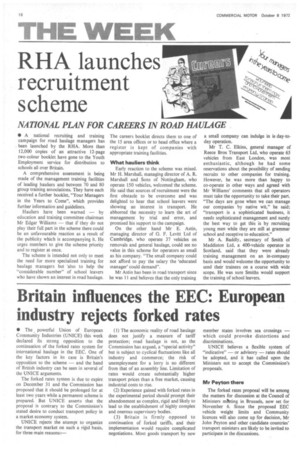Britain influences the EEC: European industry rejects forked rates
Page 20

If you've noticed an error in this article please click here to report it so we can fix it.
• The _ powerful Union of European Community Industries (UNICE) this week declared As strong opposition to the continuation of the forked rates system for international haulage in the EEC. One of the key factors in its case is Britain's opposition to the scheme — and the hand of British industry can be seen in several of the UNICE arguments.
The forked rates system is due to expire on December 31 and the Commission has proposed that it should be prolonged for at least two years while a permanent scheme is prepared. But UNICE asserts that the proposal is contrary to the Commission's stated desire to conduct transport policy in a market economy system.
UNICE rejects the attempt to organize the transport market on such a rigid basis, for three main reasons:—
(1) The economic reality of road haulage does not justify a measure of tariff protection; road haulage is not, as the Commission has argued, a -special activity" but is subject to cyclical fluctuations like all industry and commerce; the risk of unemployment for a lorry is no different from that of an assembly line. Limitation of rates would create substantially higher transport prices than a free market, causing industrial costs to rise.
(2) Experience gained with forked rates in the experimental period should prompt their abandonment as complex, rigid and likely to lead to the establishment of highly complex and onerous supervisory bodies.
(3) Britain is firmly opposed to continuation of forked tariffs, and their implementation would require complicated negotiations. Most goods transport by new member states involves sea crossings — which could provoke distortions and discriminations.
UNICE believes a flexible system of "indicative" — or advisory — rates should be adopted, and it has called upon the Ministers not to accept the Commission's proposals.
Mr Peyton there The forked rates proposal will be among the matters for discussion at the Council of Ministers mEtting in Brussels, now set for November 6. Since the proposed EEC vehicle weight limits and Community licences will also come up for decision, Mr John Peyton and other candidate countries' transport ministers are likely to be invited to participate in the discussions.






































































































